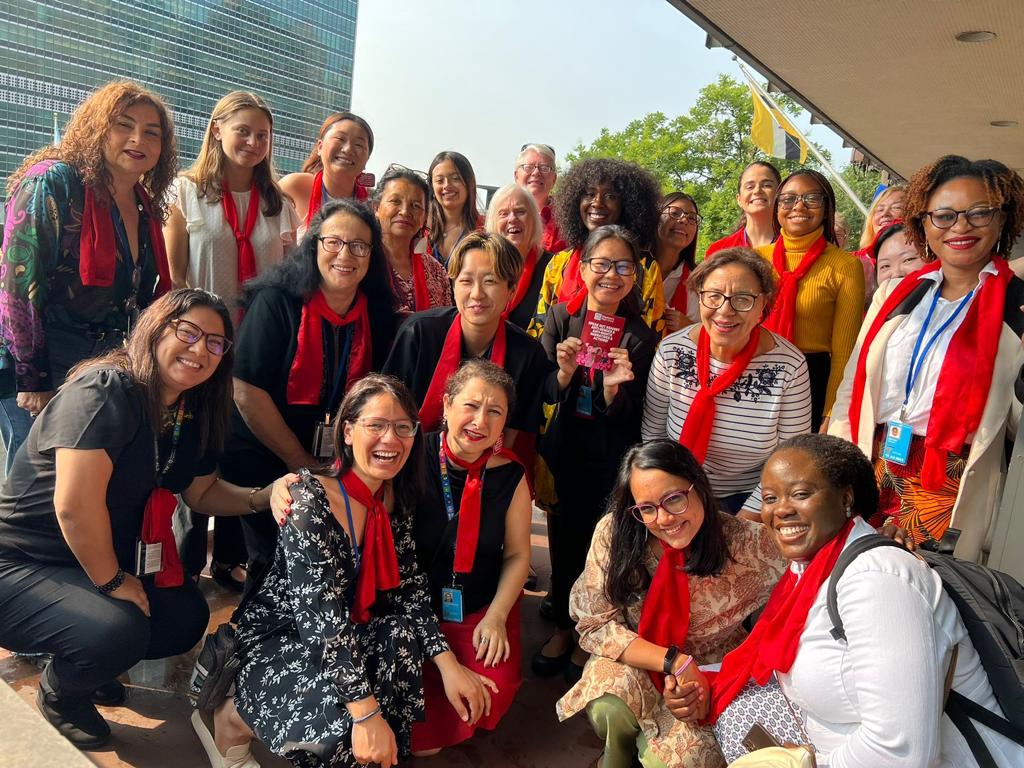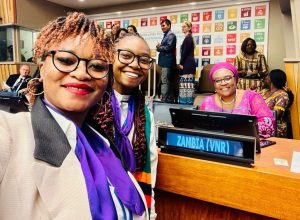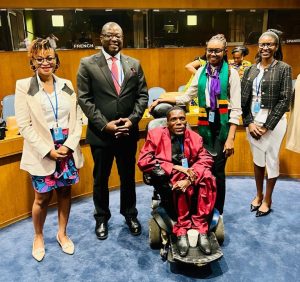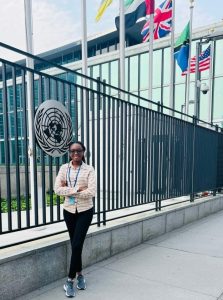Giving Youth a Seat at the Table: High-level Political Forum on Sustainable Development 2023
 25 August 2023
25 August 2023

As a youth representative from Zambia for the Make Way programme, I was delighted to recently attend the High-level Political Forum 2023 (HLPF) in New York. This opportunity provided me with the unique chance to have a seat at the table as a youth representative – ensuring young people are not only reflected, but also an active player in processes, policies and more when it comes to the implementation of the Sustainable Development Goals (SDGs) and in particular sexual and reproductive health and rights (SRHR). Prior to the HLPF, I eagerly participated in the development of the intersectional shadow report to provide alternative suggestions and recommendations to those proposed in the Zambian voluntary national review (VNR). While, during the HLPF, I advocated for youth engagement in key processes such as the VNR, particularly from the Zambian government. Youth engagement is critical to ensuring everyone, particularly minoritised youth, can enjoy their SRHR.
Did you know?
HLPF: The HLPF is the main United Nations platform on sustainable development. It provides a salient role in the follow-up and review of the implementation of the 2030 Agenda for Sustainable Development and the Sustainable Development Goals (SDGs).
VNRs: The voluntary national reviews (VNRs) are a key component during the HLPF, where countries are encouraged to share best practices, challenges and lessons learnt to advance the implementation of the 2030 Agenda in their respective countries.
Shadow report: Non-governmental organisations (NGOs) develop a shadow report as an alternative or supplement to an official government report submitted under human rights treaty obligations such as the VNR. These shadow reports allow NGOs to present opinions and recommendations of civil society on government action.
 Zambia’s Voluntary National Review
Zambia’s Voluntary National Review
This year, Zambia was in attendance at the HLPF to present its second VNR, focusing on its progress and challenges in attaining the SDGs. Prior to the HLPF, over 30 Zambian civil society organisations (CSOs) came together, coordinated by Akina Mama wa Afrika under the Make Way programme, to contribute to an alternative and intersectional shadow report. This report was developed to provide an independent review of the current status quo with regards to the SDGs in Zambia, gathering the views and perspectives of CSOs in the country. The recommendations shared in the report are focused on intersectionality, inclusivity and fostering a culture of transparency. As a regional and global youth representative for Make Way, I actively participated in the shadow report’s development through participating in several in-country VNR meetings, generating research and evidence on Zambia’s progress with the SDGs, coordinating a thematic group on SDGs 3 and 5 and identifying engagement opportunities with key stakeholders at the HLPF. It was a special opportunity to witness and contribute to the shadow report in Zambia – offering me a lot of insight and understanding into the SDGs. Yet, it was definitely challenging as I was exposed to high-level technical mechanisms and structures that CSOs and governments use to track the nation’s progress. It was particularly through my own data collection and analysis on Zambia’s progress with the SDGs that I realised how excluded young people can be from processes such as the VNR because of, amongst other reasons, the highly technical language used. It is crucial for these mechanisms to be made more inclusive and accessible to young people to ensure their participation.
 Youth Representation
Youth Representation
Beyond the development of the shadow report, I was also a youth representative, alongside Chipasha Mwansa from Akina Mama wa Afrika, at the HLPF. Together, we with our key stakeholders at the HLPF (the Zambian government, the Women’s Major Group and the permanent representative of Zambia to the United Nations) best practices and the importance of engaging young people in processes such as the VNR. Despite Zambia’s large youth demographic, the participation of young people in developmental processes still needs a lot of improvement. We provided a number of recommendations, for instance on SDG 3, good health and well-being, we advocated for the Zambian government to adopt a rights-based approach to service delivery. This would mean that all health service providers build their capacity in terms of human rights in order for them to effectively deliver services to all people with compounded vulnerabilities.
Bringing in Intersectionality
In all our interactions, we advocated for the importance of intersectionality in our work. Even as we strive to move towards a world where no one is left behind, we must collectively examine who is left behind, why they are left behind and how. The innovative approach of developing the shadow report with an intersectional lens caught the attention of Lois Mulube, the Acting Permanent Secretary of Zambia’s Ministry of Finance and National Planning, who expressed interest in us further collaborating with the Zambian government. This was a big win for us as ultimately the Zambian government decided to adopt our shadow report as the main CSO alternative shadow report for its recommendations.
 A Seat at the Table
A Seat at the Table
To have a seat at the table as a youth representative is a critical step in ensuring young people’s needs are represented and implemented in key (inter)government(al) processes and policies when it comes to SRHR. It was truly an honour to be present during the HLPF with other youth representatives, yet our presence needs to become the norm rather than the exception. Together, with other young people at the forum, including the Malala Fund and the Women’s Major Group, we used our collective voice to demand meaningful youth and women’s engagement in the VNRs, particularly for youth in all their diversities. To more meaningful youth engagement!



